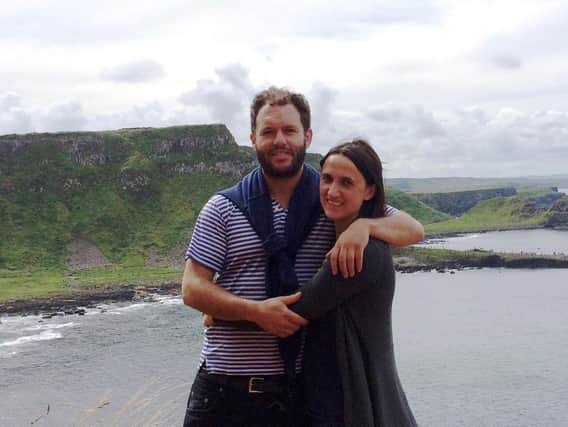I wouldn’t dare tell anyone in the North about their own history


New York lawyer and writer Chris Klatell has a particular insight into all things Derry. The reason for this? Simple - he’s married to a Derry woman!
You may well ask: who exactly is Chris Klatell? Well, he’s the man behind an ‘almanac’ which accompanies photographer Gilles Peress’ acclaimed ‘Whatever You Say, Say Nothing’ - a gargantuan piece of work which chronicles the decades-long conflict in Northern Ireland.
Advertisement
Hide AdAdvertisement
Hide Ad‘Annals of the North’ (Steidl) combines essays, stories, photographs, documents and testimonies to open up for the reader the complicated and contradictory storylines that emerged from the conflict in the North of Ireland.
Interweaving text and image, ‘Annals of the North’ examines the multifaceted struggle between republicans and nationalists, unionists and loyalists, and, of course, the British, to explore a range of broader themes.
Chris and Gilles are friends as well as collaborators and it was via this friendship that Chris secured his leading role in the ‘Whatever You Say, Say Nothing’ project.
But, first of all, to that all-important local connection. Chris’ wife, Fiona Doherty, a criminal law professor at the prestigious Ivy League Yale University in Connecticut, is originally from Derry’s Waterside. When she was a teenager, her family upped sticks and relocated to the US as part of her dad Eamon’s job with Du Pont. An initial three year transfer turned into a permanent move.
Advertisement
Hide AdAdvertisement
Hide AdIncidentally, Fiona first went to school at Claudy PS where her maternal grandparents, Jimmy and Kathleen Stone, taught.
Chris and Fiona - who have two daughters, Sophia and Maeve - met at university and, after they graduated, Fiona moved back to Ireland for a year where she worked with the Committee on the Administration of Justice(CAJ) in Belfast. This was when Chris first visited the North - not long after the signing of the Good Friday Agreement in 1998.
It was, he says, “my introduction to the political situation which seemed completely impenetrable at the time.”
Chris recalls: “My main memory of coming to Derry in those early years is of not being allowed to go anywhere - ever. The Dohertys and Stones would simply hand us from one household to the next. We used to laugh about it. We were young adults; I’d grown up in New York and Fiona was walking the length of the Ormeau Road every day in Belfast, but, in Derry, we were locked in the ‘good room’. I now realise that people were still coming out of a period of shock themselves and felt deeply responsible for us.
Advertisement
Hide AdAdvertisement
Hide Ad“We used to stay with Fiona’s grandmother, Mrs. Stone, and one day she finally agreed that we could go down to the town. Of course, it was Lundy’s Day and we ended up caught in a small riot, hiding behind a wall. Mrs. Stone had a wicked sense of humour like that, but she was also teaching us a lesson about how out of touch we actually were. Another time, I insisted I had to go to a pub to watch Arsenal play and, of course, I got swept up in a British Army patrol on my way. I didn’t know what to do and just did my broadest ‘dumb American’ act until they sent me home.”
Chris acknowledges that never in his life would he have guessed that he’d be coming to the North of Ireland for 20 years - much less working on a book related to it.
“But I’m devoted to Gilles, so, when he pulled ‘Whatever You Say, Say Nothing’ out of the box, where it had been resting for decades, I, of course, said I’d do anything I could to help get the book ready for publication. That’s when he told me that, since the book had no text, he thought it needed a ‘pamphlet’ to accompany it, and that I should work on it. Over time that pamphlet became ‘Annals of the North’, which grew to be almost 1,000 pages long, and which sent me on an odyssey to read what seemed like everything ever written about the North.”
Chris says he would never dream of telling anyone in the North “anything about their own history or their own home”.
Advertisement
Hide AdAdvertisement
Hide Ad“That’s not what ‘Annals’ is about,” he insists. “But we wanted people outside the North to be able to have the emotional reaction to Gilles’s photographs that I’d had and to understand the structure of history that he was trying to articulate. I thought of myself almost like a translator: I’d had to learn how to make sense of things as an outsider, and I wanted to put the same information at other people’s disposal. Names, dates, songs, maps, stories, laws, jokes, bars, documents – everything.”
“The law”, says Chris, plays an important role in both “Annals of the North” and “Whatever You Say, Say Nothing”.
“In many ways, Gilles’s terrible experience with Widgery and the British papers after Bloody Sunday changed his life and determined the course of both books. Gilles couldn’t believe that he and everyone else had seen what happened that day, and he had pictures, yet the law (and journalism) failed completely to render any kind of justice. It forced him to rethink how visual language worked or could work differently.”
Chris says part of the pleasure of the research that went into “Annals” was that he began to understand some things – including about his own wife – that no one could or would say.
Advertisement
Hide AdAdvertisement
Hide Ad“For the rest of the world, the books might be about imperialism and the helicoidal structure of history, or about post-modern theories of visual ontology, but, in the North, I think they’re about the dance between the said and the unsaid.”
○ ‘Annals of the North’, by Chris Klatell and Gilles Peress, is published by Steidl.